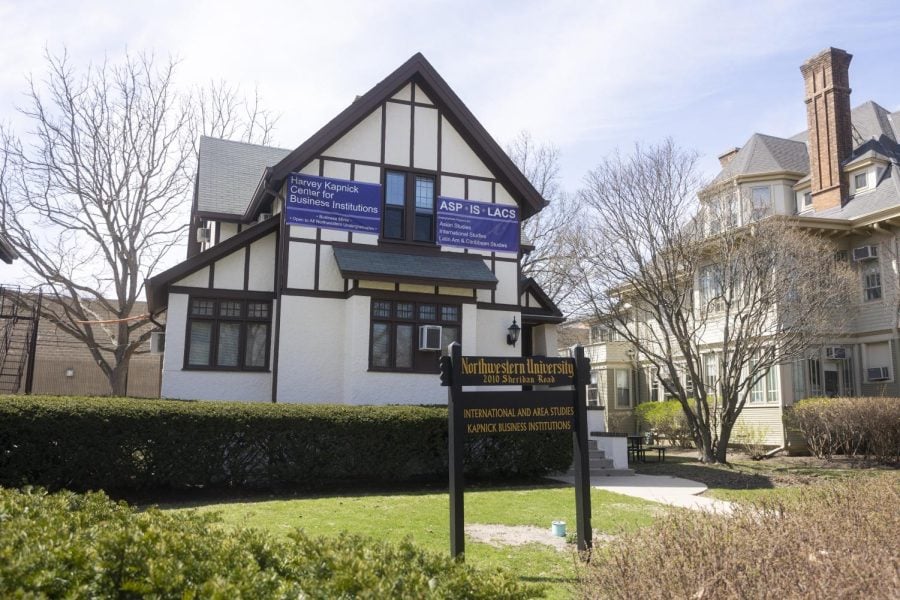Scholars discuss archival justice and preservation in MENA region at MENA Studies Program and Kaplan Institute panel
Daily file photo by Ava Mandoli
2010 Sheridan Rd. Researchers talked about the challenges and legitimacies of archives in a MENA Studies Program and Alice Kaplan Institute panel Monday.
May 9, 2022
Academics discussed the recovery and reimagination of archives in the Middle East and North Africa region in a Monday panel, hosted by Northwestern’s MENA Studies Program and the Alice Kaplan Institute for the Humanities.
The virtual panel featured Columbia University Prof. Gil Hochberg, Cambridge University Prof. Yael Navaro and Arab Image Foundation Board Member Vartan Avakian, a current artist in residence for NU MENA Studies and the Kaplan Institute.
MENA Studies postdoctoral fellow Anoush Suni, who moderated the roundtable, said Avakian’s creative work inspired the event, which focuses on how colonialism impacts archival work by erasing or omitting archives for certain groups.
“Between the three of these thinkers, writers and artists, we have a window into the post-Ottoman lands of contemporary Turkey, Lebanon and Palestine … with a particular attention to marginalized and minoritized communities whose stories, experiences, material worlds and archives have often been silenced, erased and destroyed,” Suni said.
Navaro gave an overview of her research on the legacy of the 1974 Turkish invasion of Cyprus that displaced thousands of civilians, costing them their homes and possessions. She discussed how ethnic Turkish Cypriots, who established an autonomous region in northern Cyprus, created a state built from “ganimet” — the Turkish word for loot.
This loot was property that Turkish Cypriots “misappropriated, expropriated and assumed” from Greek and Armenian Cypriots, Navaro said.
These possessions — including personal photographs and household objects — are still on display in many homes in northern Cyprus, despite efforts by the Turkish Cypriots and the U.N. to return them, Navaro said. Other Greek-language books left behind, she said, ended up in a library in the same region. The history of looting behind those collections calls into question whether they should be considered archives, she said.
“Rendering something archival, or interpreting, studying and mobilizing it as a form of archive, can be a form of politics, an attempt to seek rights, to claim compensation, to ask for retribution for past crimes,” Navaro said.
Avakian spoke about archival data and how photograph digitization informs his work at the Arab Image Foundation, a nonprofit that holds more than 500,000 photos from the MENA region. Remotely stored cloud data is still material because of its physical storage in warehouses and servers, he said.
Avakian added that mediums like photographs, books and vinyl records are all methods of data storage that take the form of a scratch or a stain.
“In this respect, they are not fundamentally dissimilar to dreams, recollections, feelings and biological inscriptions on DNA polymers,” Avakian said.
Hochberg presented her work on “archival imagination for the future,” which focuses on Palestinian archives. She said many archives of Palestinian history have been built through illegitimate means such as looting.
Still, Hochberg said Palestinians have managed to create alternative archives through artwork. She presented examples such as “ex libris”, a multimedia documentation of Palestinian books in a Jerusalem library by Emily Jacir, and “In The Future They Ate from the Finest Porcelain,” a sci-fi short film by Larissa Sansour and Søren Lind that discusses themes of loss and burial.
“The importance of these works is not because it just gives a … minority touch to alternative archives, but that all important political change begins with imagination,” Hochberg said. “And our work is to imagine.”
Email: rjleung7@u.northwestern.edu
Twitter: @rjleung7
Related Stories:
— Shorefront Legacy Center works with NU grad students to record oral history with Black residents



